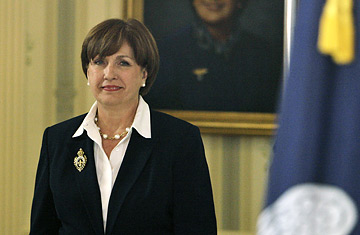
Louisiana Gov. Kathleen Blanco walks to the podium to announce that she will not seek reelection at the Governor's Mansion in Baton Rouge, La., Tuesday, March 20, 2007.
Soft-spoken and matronly, Blanco retained the mannerisms of the Cajun Country high school teacher she once was even as she rose through the ranks of Louisiana politics to become, in 2003, the state's first female governor. And those qualities served her well until Hurricane Katrina hit. In the storm's chaotic aftermath, when Louisianans craved strong leadership, she came across as weak and indecisive. Blanco's performance earned her the dubious title of one of TIME magazine's "worst governors"; as her approval ratings plummeted, so did the Democratic governor's prospects for a second term.
Public opinion polls showed Blanco losing by a whopping margin in a rematch with her 2003 runoff opponent, Republican Bobby Jindal, now a U.S. representative and one of only two Republicans who have announced plans to run for the state's top job. Jindal, who tacked hard to the right to win his suburban New Orleans district seat in 2004, has the backing of the state party. Now, another candidate, state Senator and wealthy businessman Walter Boasso, has been running television ads touting his anti-establishment credentials.
For Democrats, it is a veritable free-for-all. Louisiana public service commissioner Foster Campbell, a North Louisiana populist in the Huey Long tradition, is in the running. But many are pinning their hopes on former U.S. Senator John Breaux, who left office in 2005 to join a powerful Washington, D.C., lobbying firm. Breaux remains a popular, widely known figure, but there's one problem: having changed his permanent address to Maryland, he may be ineligible to run for state office under residency requirements set forth in Louisiana's constitution, a snag Republicans started hammering away at in television attack ads even before Blanco stepped aside.
Breaux is said to be under pressure to make a decision in the next few days, legal questions notwithstanding. "The ball is in his court," says independent pollster Bernie Pinsonat. "He probably thinks he can win. The question is, does he want to leave a great job and come down here, make $100,000 a year and spend his life dealing with partisan politics?" Pinsonat says his most recent poll shows Jindal leading Breaux by 30 percentage points. "It doesn't mean [Breaux] can't win," he says. "But he can't come down here and expect a coronation."
There's still time for another high-profile candidate to enter the race, perhaps lieutenant governor Mitch Landrieu, a Democrat and younger brother of U.S. Senator Mary Landrieu. He lost a bid to replace New Orleans mayor Ray Nagin last year. But the state's scrambled demographics could complicate matters: Hurricane Katrina cut the population of New Orleans, a Democratic stronghold, by half. And while many of those voters, mostly African-American, have resettled elsewhere in Louisiana, the dispersal will make it harder for Democrats to cobble together the coalition of black and Cajun votes that have traditionally helped them squeak by in statewide races.
As long as the Breaux question remains unsettled, it appears that Louisiana may be headed for another milestone: Jindal, if he succeeds the state's first woman governor, would become the nation's first Indian-American governor. But Louisiana's peculiar open primary system, in which candidates of all parties vie for a spot in the November runoff election, has a way of producing surprises; throw the lingering effects of Katrina in the mix, and anything is possible. Just ask Kathleen Blanco.
